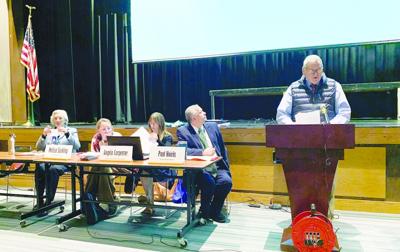BRISTOL — In a 35-9 vote, residents of the Newfound Area School District ratified the decisions of the annual meeting held at the beginning of the year on Tuesday, allowing tax rates to be set for the four sending towns of Alexandria, Bristol, Danbury and New Hampton.
While the results seemed to be a foregone conclusion, the procedural defect meeting on Nov. 4 gave residents a chance to challenge administrators on the errors in posting budgets on the required state forms, and their failure to post signed copies of the school warrant articles. They also failed to meet the Jan. 31 deadline for filing the forms.
“Doesn’t that kind of go with job training?” asked Dana Torsey of New Hampton. “Don’t you know, if you don’t know how to put it on the right forms, doesn’t somebody walk you through? Again, that’s why we’re paying legal fees.”
“Well, nobody’s perfect. People do make mistakes,” Attorney Barbara Loughman responded.
Superintendent Paul Hoiriis said administrators were following state statutes, which do not specify the need to provide information on state Department of Revenue Administration forms. The budget was posted, “and actually probably with more information than was required on the form,” Hoiriis said.
“If folks remember, it was a big, thick packet in much greater detail than the form requires.”
Business Administrator Angela Carpenter has previously explained the form also requires prior-year budget information she did not have at the time. A cyberattack in November 2023 wiped out the district’s financial data, and the 2023-24 budget had not been recovered by the time she was hired into the position on July 1, 2024.
Hoiriis noted there was a complete turnover of administrators in the school district in the summer of 2024, and “the new team led the charge to rebuild the financial system. It resulted in some delays and some technical defects in that budget process.”
That included problems calculating the default budget, which was being revised right up to the February deliberative session.
The warrant articles were posted well in advance, but had not been signed by members of the Newfound Area School Board, another defect noted by state DRA staff.
The greatest technical error was in missing the January deadline for sending the information to the DRA. During a break in the meeting, Loughman said that was the error the courts were likely to be most concerned about. The other issues raised were minor defects that could be easily explained.
Torsey asked, “At what point did we know this meeting was illegal? Before the meeting? Did we know after meeting? We know six months later? Why did we not know before this that what we’re doing was illegal?”
“They’re basically posting errors, not errors in the process at the meeting itself,” Loughman said.
Torsey pursued the question, asking, “We had to post something, right? Isn’t that due every year in January?”
Paul Regan of Bristol said, “I understand this is a procedural error, that the information was there, but it wasn’t on the correct form. What I don’t understand is if, for some reason, we vote 'no' tonight ... what’s the downside?”
Loughman said if the decisions were not ratified, the DRA would have to decide whether to allow or disallow the appropriations approved at the annual meeting.
“If DRA disallows the appropriations, there is an appeal process. It’s not very often used, but we would have the right to appeal to the commissioner of DRA from the decision of the auditor, who actually works with the towns to set the rate,” Loughman said. “If DRA commissioner turns us down, then the next step would be to file a petition for certiorari in the Superior Court, and ask the Superior Court to rule in our favor. I’ve been involved in that process only once, and it was like 35 years ago, and we didn’t get the decision from the Superior Court until the fiscal year was almost over. So the consequences of not voting to legalize the meeting are that there is uncertainty as to whether the Department of Revenue Administration will fund the warrant articles that the voters approved.”


















(0) comments
Welcome to the discussion.
Log In
Keep it Clean. Please avoid obscene, vulgar, lewd, racist or sexually-oriented language.
PLEASE TURN OFF YOUR CAPS LOCK.
Don't Threaten. Threats of harming another person will not be tolerated.
Be Truthful. Don't knowingly lie about anyone or anything.
Be Nice. No racism, sexism or any sort of -ism that is degrading to another person.
Be Proactive. Use the 'Report' link on each comment to let us know of abusive posts.
Share with Us. We'd love to hear eyewitness accounts, the history behind an article.